Hello Junkies!
Want to count to a thousand and a million in Japanese? Good! You’ll learn it all in the next 3 minutes. And if you know how to count in big Japanese numbers, you can…
- Get rich (or die trying)
- Talk about big money
- Count the number of people in Japan
- and much more…
If you don’t know how to count from 1-100, check out this lesson first: “Counting in Japanese 1-100 for Beginners.”
Okay, let’s get to it! Don’t worry, it’s easy. We will take you step-by-step, so you go through all the basic numbers. You can also print out this article out and use it as reference material. Sound good? Good!
- Part 1: How to count from 100 to 1,000
- Part 2: How to count from 1,000 to 10,000
- Part 3: How to count from 100,000 to 1 Million in Japanese
- Part 4: Useful phrases with numbers
Part 1: How to count from 100 to 1,000 in Japanese
By the way…
You should also listen and hear the numbers pronounced in native Japanese.
Press play below. Try this Free Lesson on Numbers from JapanesePod101.com (click here for more awesome lessons).
- Numbers Lesson #1 by JapanesePod101.
- This 9-minute lesson covers how to say thousand and million in Japanese.
Now…
If you already know how to say 1-10 in Japanese, then this will be very easy.
One hundred or hundreds is “hyaku” and “thousands” is “sen” in Japanese.
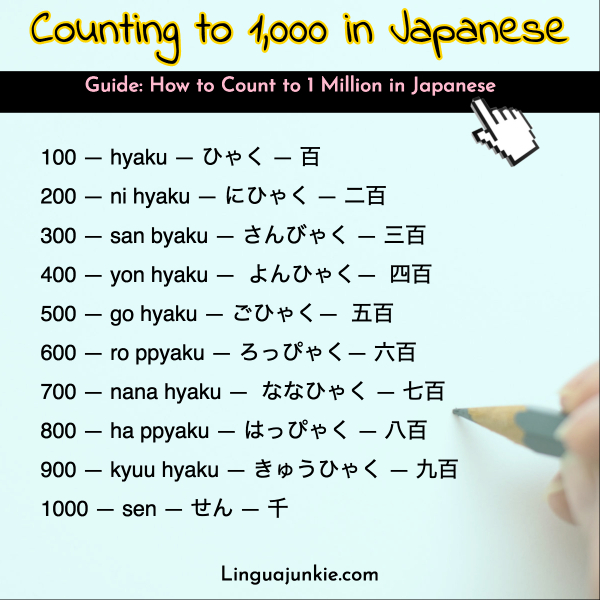
These are the only two things you need to remember, and follow the rules below:
- Rule: Add the number (1-9) from our previous lesson to “hyaku”.
- Format: (any number from 1 to 9) + hyaku
- Examples: 400 is yon hyaku, 700 is nana hyaku
| Number | Romaji/English | Hiragana | Kanji |
| 100 | hyaku | ひゃく | 百 |
| 200 | ni hyaku | にひゃく | 二百 |
| 300 | san byaku | さんびゃく | 三百 |
| 400 | yon hyaku | よんひゃく | 四百 |
| 500 | go hyaku | ごひゃく | 五百 |
| 600 | ro ppyaku | ろっぴゃく | 六百 |
| 700 | nana hyaku | ななひゃく | 七百 |
| 800 | ha ppyaku | はっぴゃく | 八百 |
| 900 | kyuu hyaku | きゅうひゃく | 九百 |
| 1000 | sen | せん | 千 |
Wait! If you’re smart enough, you might have noticed that there are some numbers that do not use “hyaku.” They use the same kanji but have different sounds: “byaku” and “ppyaku.” So, there are a few exceptions to remember.
The numbers that use these sounds are 300, 600, and 800.
- 300 becomes san byaku
- 600 becomes ro ppyaku – ro comes from the number 6 roku
- 800 becomes ha ppyaku – ha comes from the number 8 hachi
These are the only extra things you need to memorize when counting to a thousand in Japanese.
Counting from 101 to 999
Now, that you know the basic hundreds, let’s try counting the in-between numbers. This is easy if you know how to count from 10 to 100. Just follow this rule.
- Rule: Add any number from (1-9) with hyaku, then add any number from (1-9) with juu, then any number from (1-9).
- Format: ((any number from 100 to 900) + hyaku) + ((any number from 1-9) + juu) + (any number from 1-9)
- Examples: 111 is hyaku juu ichi, and 368 is san byaku roku juu hachi
Part 2: How to count from 1,000 to 10,000 in Japanese
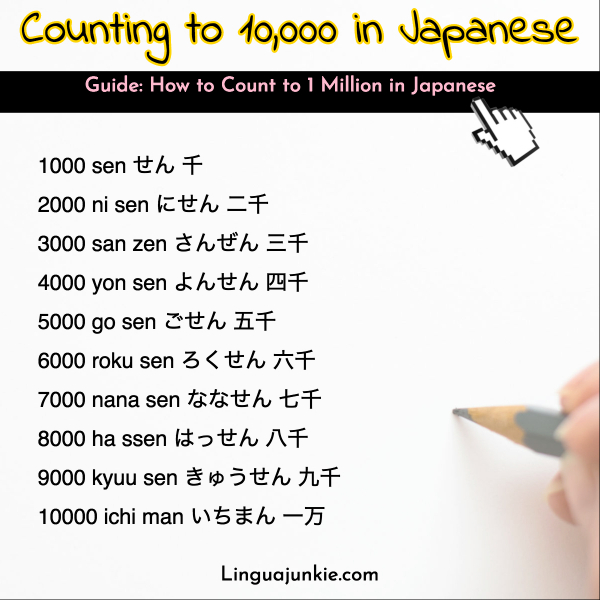
Ready to count to a thousand in Japanese? Yes?
Good.
Counting from 1,000 to 10,000 gets a little longer, but as simple as what you learned in Part 1. Just follow this rule for counting thousands in Japanese.
- Rule: Add the number (1-9) to sen. It’s just the same rule we had in part 1, but instead of hundred or hyaku, we use thousand or sen.
- Format: (any number from 1 to 9) + sen
- Examples: 4,000 is yon sen and 9,000 is kyuu sen.
That wasn’t so hard!
Here is the full list on how to count from 1,000 to 10,000.
| Number | Romaji/English | Hiragana | Kanji |
| 1000 | sen | せん | 千 |
| 2000 | ni sen | にせん | 二千 |
| 3000 | san zen | さんぜん | 三千 |
| 4000 | yon sen | よんせん | 四千 |
| 5000 | go sen | ごせん | 五千 |
| 6000 | roku sen | ろくせん | 六千 |
| 7000 | nana sen | ななせん | 七千 |
| 8000 | ha ssen | はっせん | 八千 |
| 9000 | kyuu sen | きゅうせん | 九千 |
| 10000 | ichi man | いちまん | 一万 |
As you can see, similar to Part 1, there also some exceptions that stand out. In this case, 3000 becomes san zen, instead of sen.
Counting from 1,001 to 9,999
This should be quite simple. Let’s take a look how to count in-between numbers!
The rules and format are pretty much the same. All you need to do is count from top to bottom or bigger digits to small.
- Rule: Add a number (1-9) to sen, follow with any number (1-9) with hyaku, then any number (1-9) with juu, and finally followed by any number from (1-9).
- Format: ((any number from 1 to 9) + sen) + ((any number from 1 to 9) + hyaku) + ((any number from 1 to 9) + juu) + (any number from 1 to 9)
- Examples: 4,345 is yon sen san byaku yon juu go, and 7,777 is na na sen na na hyaku na na juu na na
How to count 10,000
We also need to take a closer look at this number as the counting changes.
In English, 1,000 and 10,000 both still have thousand in them, but in Japanese, 10,000 is where you start to count in “man” or the direct translation would be “million”.
This may get a bit confusing at first, but trust me, it’s just about getting used to. One trick I remember using is associating “man” and 10,000 as the biggest note in Japanese Yen. So, you can always take a mental note that once it is the biggest note, then it’s time to say “man.”
Now you can count over a thousand in Japanese.
You are more than half way through!
Let’s get right into the last segment, so you get ready to counting big!
Part 3: How to count from 100,000 to 1 Million in Japanese
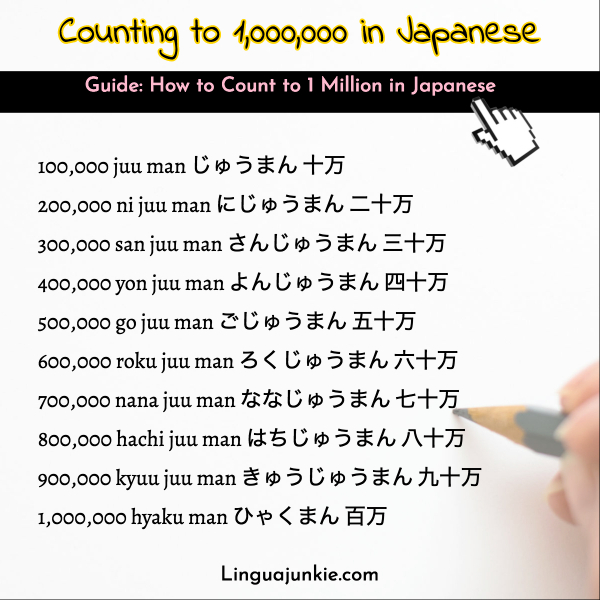
Almost there. You are at the last part of this “count to 1 Million in Japanese” lesson.
This will be as easy as the previous parts. The same rules apply, but are just longer.
- Rule: Add the number (10-100) to man, then add the number (1-9) to sen, follow with any number (1-9) with hyaku, then any number (1-9) with juu, and finally followed by any number (1-9).
- Format: ((any number from 10 to 100) + man) + ((any number from 1 to 9) + sen) + ((any number from 1 to 9) + hyaku) + ((any number from 1 to 9) + juu) + (any number from 1 to 9)
- Examples: 789,600 is na na juu hachi man kyuu sen ro ppyaku, and 1,234,546 is hyaku ni juu san man yon sen go hyaku yon juu roku
Take a look at the list below to count from 100,000 to 1,000,000 for easier reference.
| Number | Romaji/English | Hiragana | Kanji |
| 100,000 | juu man | じゅうまん | 十万 |
| 200,000 | ni juu man | にじゅうまん | 二十万 |
| 300,000 | san juu man | さんじゅうまん | 三十万 |
| 400,000 | yon juu man | よんじゅうまん | 四十万 |
| 500,000 | go juu man | ごじゅうまん | 五十万 |
| 600,000 | roku juu man | ろくじゅうまん | 六十万 |
| 700,000 | nana juu man | ななじゅうまん | 七十万 |
| 800,000 | hachi juu man | はちじゅうまん | 八十万 |
| 900,000 | kyuu juu man | きゅうじゅうまん | 九十万 |
| 1,000,000 | hyaku man | ひゃくまん | 百万 |
Counting from 100,001 to 999,999
You’re almost done! Let’s count the in-between numbers. As long as you follow the rules from the previous parts you’ll do just fine!
- Rule: Add the number (10-99) to man, follow with any number (1-9) with sen, then any number (1-9) with hyaku, followed by any number (1-9) with juu, then finally any number (1-9).
- Format: ((any number from 10 to 99) + man) + ((any number from 1 to 9) + sen) + ((any number from 1 to 9) + hyaku) + ((any number from 1 to 9) + juu) + (any number from 1 to 9).
- Examples: 876,900 is hachi juu nana man roku sen kyuu hyaku, and 608,009 is roku juu man hassen kyuu.
Now you know how to count up to a million in Japanese. That completes your lesson of counting from 100 to 1 Million. It wasn’t as hard as you thought was it! Now that you know how to count big numbers, let’s try to see how we can use them in conversations.
Part 4: Useful Phrases with Big Japanese Numbers.
How much is this item?
- Kono aitemu wa ikura desuka?
- このアイテムはいくらですか。
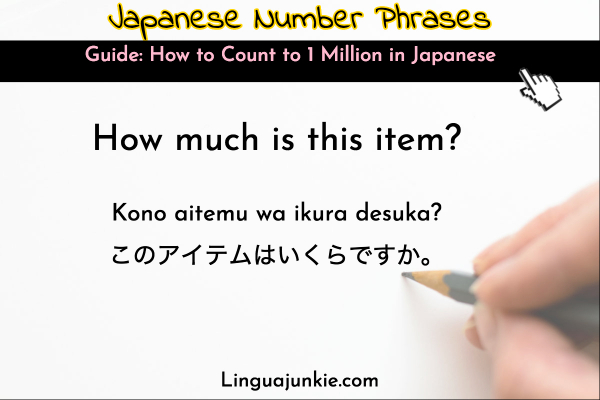
This item is 1,999 Yen.
- Kochira no aitemu wa sen kyuu hyaku kyuu juu kyuu en ni narimasu.
- こちらのアイテムは、1,999円になります。
Quick tip: You can try practicing by reading out prices to yourself every time you see one.
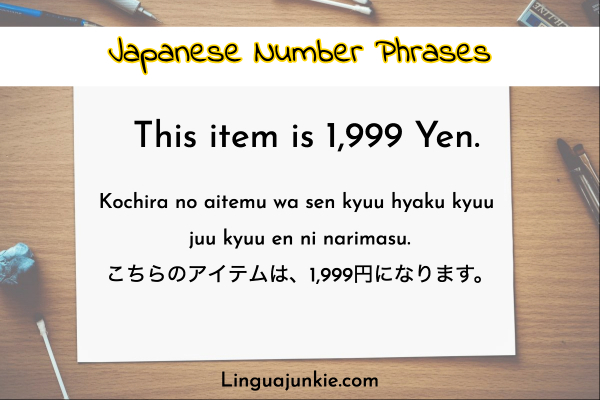
How much is the discount for the promo today?
- Kyou no puromo de ikura makete moraemasuka?
- 今日のプロモでいくらまけてもらえますか。

Today is 50% off, so that would be a total of 230,030 Yen.
- Honjitsu wa go ju ppa-sento ofu to narimasunode, goukei ni juu san man san juu en to narimasu.
- 本日は、50%オフとなっておりますので、合計230,030円となります。

Another way you can practice is by doing math in Japanese. Here are some math terms you can use to practice.
・Plus – tasu – たす
・Minus – hiku – ひく
・Times – kakeru – かける
・Divided by – waru – わる
That’s it! You’ve counted to 1 Million in Japanese! The counting gets longer as the numbers get bigger, but as long as you practice, you’ll be able to master in no time! Was that helpful? Don’t forget to leave a comment!
– The Main Junkie
P.S. Highly recommended for learners. If you REALLY want to learn Japanese, I suggest JapanesePod101. Why? You get 2,000+ fun audio/video lessons, tons of study tools, PDF eBooks, Apps and more. Sign up for free at JapanesePod101 (click here) and start learning!
Click here to get your free lifetime account at JapanesePod101

Is it sen or sog
138 in in japaneせ, help me po
Hi,
The example # of 1,234,546 in Part 3, doesn’t follow the given format since it’s greater than 1,000,000
Format: ((any number from 10 to 100) + man) + ((any number from 1 to 9) + sen) + ((any number from 1 to 9) + hyaku) + ((any number from 1 to 9) + juu) + (any number from 1 to 9)
1,234,546 hyaku ni juu san man yon sen go hyaku yon juu roku
123 (hyaku ni juu san) doesn’t fit the “any number from 10 to 100 + man” range
arigatogozaimasu! this is really helpful along with the 1-100! thanks to you i learned 1-100 in like 3-5 minutes!
so… I know irregular Japanese numbers 300 sanbyaku
3,000 sanzen
Japanese numbers are easy Like 1,000,000 hyaku man but what about 999,999,999,999
I think there maybe a typo in the example:
608,009 is roku juu ha ssen kyuu
Shouldn’t it be 608,009 is roku juu MAN ha ssen kyuu?
Interesting article! What does this line mean though? is where you start to count in “man” or the direct translation would be “million” I thought man meant 10,000? Also could someone clarify how to write numbers over 1 million. The example of 1,234,546 in the section How to count from 100,000 to 1 Million in Japanese is confusing me??? 1,234,546 is hyaku ni juu san man yon sen go hyaku yon juu roku I’m trying to follow the rules: Add the number (10-100) to man, then add the number (1-9) to sen, follow with any number (1-9) with hyaku, then… Read more »
how to read this 23,000 yen
= ni juu san man yen?
or
= ni juu man san sen yen?
is it byaku or hyaku?
Please to 1 to 100000 in japanese